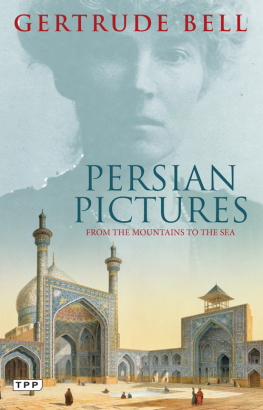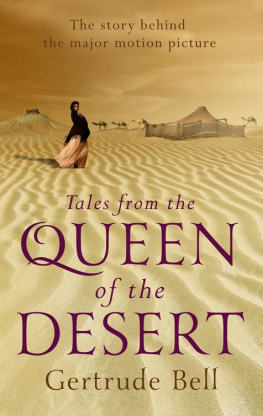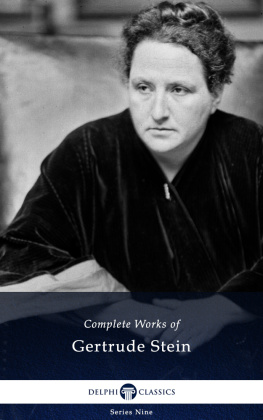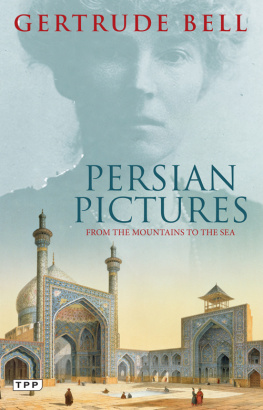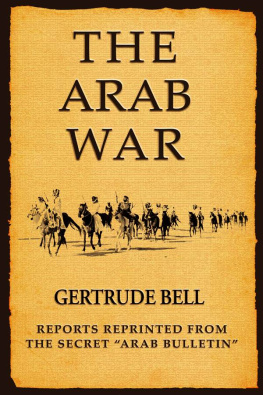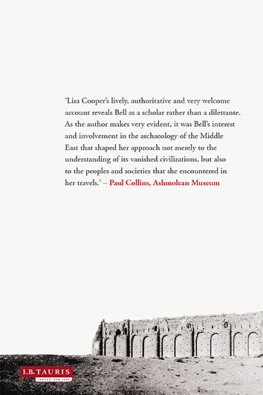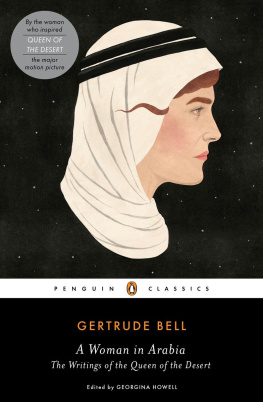SAFAR NAMEH
PERSIAN PICTURES
A Book Of Travel
By
GERTRUDE BELL
First published in 1894
This edition published by Read Books Ltd.
Copyright 2019 Read Books Ltd.
This book is copyright and may not be
reproduced or copied in any way without
the express permission of the publisher in writing
British Library Cataloguing-in-Publication Data
A catalogue record for this book is available
from the British Library
Warum bin ich vergnglich, O Zeus? so fragte die Schnheit.
Macht ich doch, sagte der Gott, nur das Vergngliche schn.
Und die Liebe, die Blumen, der Tau und die Jugend vernahmens,
Alle gingen sie weg weinend von Jupiters Thron.
- Goethe
Now, a traveller is a creature not always looking at sightshe remembers (how often!) the happy land of his birth; he has, too, his moments of humble enthusiasm about fire and foodabout shade and drink.
- Kinglake
Contents
Where is my ruined life, and where the fame
Of noble deeds?
Look on my long drawn road, and whence it came,
And where it leads!
Can drunkenness be linked to piety
And good repute?
Where is the preacher's holy monody,
Where is the lute?
From monkish cell and lying garb released,
Oh heart of mine,
Where is the tavern fane, the tavern priest,
Where is the wine?
Past days of meeting, let the memory
Of you be sweet!
Where are those glances fled, and where for me
Reproaches meet?
His friend's bright face warms not the enemy
When love is done-
Where is the extinguished lamp that made night day,
Where is the sun?
Balm to mine eyes the dust, my head I bow
Upon thy stair.
Where shall I go, where from thy presence? thou
Art everywhere.
Look not upon the dimple of her chin,
Danger lurks there!
Where wilt thou hide, oh trembling heart, fleeting in
Such mad haste- where?
To steadfastness and patience, friend, ask not
If Hafiz keep-
Patience and steadfastness I have forgot,
And where is sleep?
Gertrude Lowthian Bell
PREFACE
The letters of Gertrude Lowthian Bell are so fresh in the public mind, and seem so clearly destined to become a classic, that there is little need in this place for biographical details.
It will suffice to say that she was born on July 14, 1868, at Washington Hall, Durham, the the residence of her grandfather, the late Sir Lowthian Bell. In 1885 she entered Lady Margaret Hall, Oxford, and in 1887 took a brilliant First in History. During her student days in Oxford, when she indulged in games with no less zeal than in her studies, she seems to have caught the fever of the Orient, so that when in 1891 her uncle Sir Frank Lascelles was appointed Minister in Teheran we find her declaring that the great ambition of her life was to visit Persia. Thus it came about that in the spring of 1892 Gertrude Bell set out for Teheran with Lady Lascelles, and the little book now re-issued was the fruit of this first excursion into the East. Part of it was written on the spot and part of it after her return to England. In a letter dated 1892 (presumably in December) she writes, 'Bentley wishes to publish my Persian things, but wants more of them, so after much hesitation I have decided to let him and I am writing him another six chapters. It's rather a bore and what's more I would vastly prefer them to remain unpublished. I wrote them you see to amuse myself and I have got all the fun out of them I ever expect to have, for modesty apart they are extraordinarily feeble. Moreover I do so loathe people who rush into print and fill the world with their cheap and nasty work- and now I am going to be one of them. At first I refused, then my mother thought me mistaken and my father was disappointed and as they are generally right I have given way. But in my heart I hold very firmly to my first opinion. Don't speak of this. I wish them not to be read.'
It is interesting to hear that Gertrude Bell had so poor an opinion of her first essay in literature, and it is also interesting to learn that the six chapters were, so to speak, written in order: for I think it must be conceded that there is a something in those chapters which were written in Persia which is wanting from the later ones, in spite of their charm and style and characterization. In the end the little book appeared anonymously, and thus a compromise was effected between the wishes of her parents and her own modesty.
It may suitably be recalled that a somewhat similar fate attended another book of Persian travel, namely Edward G. Browne's Year Amongst the Persians, which appeared a year before Persian Pictures. Neither Edward Browne nor his publisher seems to have realized the exceptional qualities of this book, which was never reprinted until after his death of that great scholar in 1925.
Miss Bell's little book is of course slight in comparison with Browne's, and whereas Browne took with him to Persia a first-class knowledge of the language and literature of that country, Miss Bell had only studied Persian for a few months previously to her departure for Teheran. In that brief space she had, however, learnt to read with some degree of fluency, and she no doubt understood a great deal of what was said to her in conversation, though she refers to the constant use of an interpreter.
There is a peculiar magic in the air of Persia which inspires all who visit her with poetry and romance: and this is not easily explained: for Persia to-day is a country in which very few traces remain to remind the traveler of her past glories. The cities of old Iran have been built and destroyed in the course of her long history, and nature and man seem to have combined to place Persia in our day under the ban of neglect. A score of cities have in turn been royal capitals, and as such have received all the embellishments that powerful monarchs could bestow on them, only to be abandoned and finally left in ruins, and even the ruins have often been ruthlessly destroyed. The country itself is full of vast desolate tracts. In spite of all this Persia casts her spell on every traveler, a spell worked by marvelous sunsets over the undulating deserts, by the glorious gardens the Persians love so well, and, last but not least, of the subtle charm of the Persians themselves, who are all poets and philosophers of nature, whether prince or muleteer. Like Kinglake's Ethen, this little book is free from all details of geographical discovery or antiquarian research, from all political disquisitions and from all useful statistics. It is a book of travel to be classed with that choice group of English works which include Young's Travels and Borrow's Bible of Spain. Only in the chapter entitled ' A Murray of the First Century' do we get a foretaste of Miss Bell's later work in the field of archology which earned for her a world-wide fame among scholars. The mention of Ethen reminds us of the famous chapter in which Kinglake describes the plague of Cairo, and it was a curious coincidence that took Miss Bell to Persia when a cholera epidemic was at its height, and gave her the opportunity of observing the behavior of the Persian populace in the face of this dread disease, just as Kinglake had watched the Egyptians nearly eighty years earlier.




